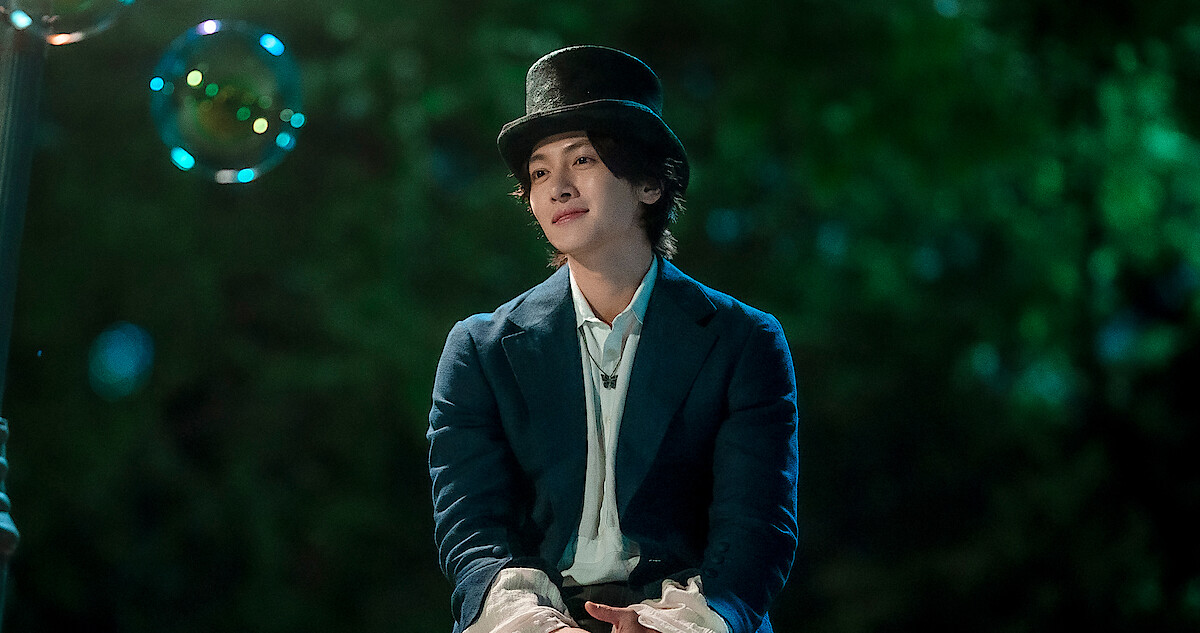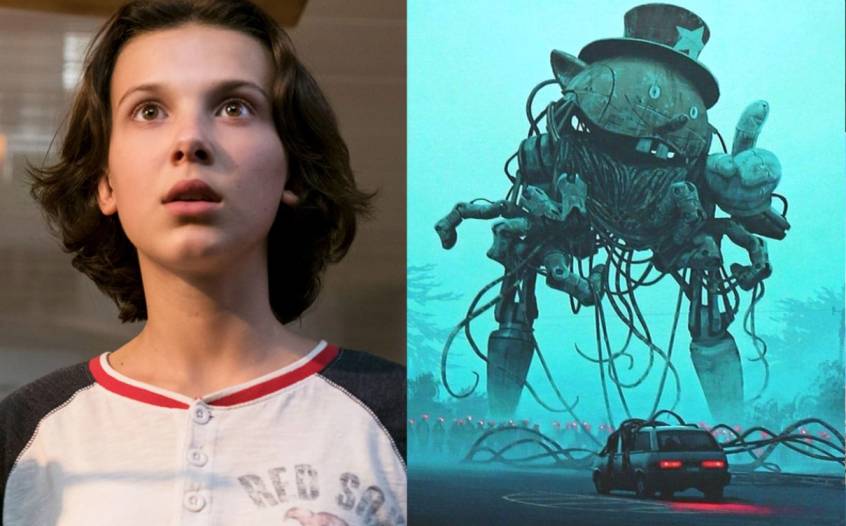By Rashmi Goel

There is nothing quite like The Sound of Magic on American TV, like many Korean dramas and other international dramas, despite comparisons with some rather dissimilar western media references. This six-part Netflix drama, reminiscent of both The Greatest Showman and an episode of CSI, follows Seoul teens Yoon Ah-yi (Choi Sung-eun) and Na Il-deung (Hwang In-youp) following their meeting with an eccentric local magician named Ri-eul (Ji Chang-wook). As Ah-yi and Il-deung learn magic at Ri-eul's home in an abandoned theme park to escape from their hectic lives, violent attacks threaten the community, and they are forced to determine if Ri-eul is behind them. There is also singing.

Adapted from a webtoon called Annarasumanara (used here similar to "abracadabra"), The Sound of Magic has been advertised as a fantasy musical series. Although, viewers who expect primarily genre-driven stories may be let down. As a series, it is inconsistent in its commitment to both the musical format and the fantasy genre. During its first half, it concentrates on its effervescent, could-be-real-magic musical numbers before turning into a sensational crime drama that involves a missing teen. In spite of the short episode order (Korean dramas normally run for a minimum of 16 episodes), the series comes the closest to achieving most of its many narrative ambitions in exploring its coming-of-age themes as protagonists Ah-yi and Il-deung grapple with the question of what kind of person they hope to grow into in the absence of positive adult role models.

Despite its unevenness, The Sound of Magic is wonderful when it's good, especially in the way it articulates Ah-yi and Il-deung's anxieties and hopes. They share a deep frustration with their parents, who fail to provide for them in a variety of ways. As for Ah-yi, who was abandoned by both her parents while she was still a child and was left in charge of raising her younger sister, the failures may be a bit more evident to American viewers. In contrast to most of her classmates, Ah-yi is concerned about finding enough money to buy dinner. Her poverty is quite obvious, but no one in her life cares enough to notice or take action to help her. Instead, they are shown to be more interested in catering to Ah-yi's privileged classmates and their parents.

Il-deung seems to have everything Ah-yi lacks. At the mere suggestion that an iPad might be useful for his studies, his parents not only are present, but also actively involved in his life. Il-deung's mother is always ready with snacks and to take him to his hagwon, the tutoring academies in Korea. He has teachers who bend over backwards to help him. It soon becomes apparent that, though Ah-yi's parents are absent, Il-deung's parents are too present, micromanaging every choice he makes in order to maximize his test scores and guarantee a future as prosperous and successful as his father's. As he works himself to the bone for his parents' dream, Il-deung becomes increasingly unsure if it is worth it. In response to his concerns, his parents advise him to keep studying.

Ah-yi's struggles to meet her basic needs are more legitimate than Il-deung's worries, so it is an important step to acknowledge Il-deung's worries in a country where young people have been dying of suicide since 2007. Under the weight of economic and social pressures of a country with wealth inequity, Il-deung represents a not-insignificant number of Korean youth who cry out (or stay silent). Ri-eul, who seems to have abandoned all pursuit of traditional success in favor of a childlike life as a magician, stands in contrast to the other adults in Ah-yi and Il-deung's lives. In the beginning, both Ah-yi and Il-deung are angrily skeptical of Ri-eul's life choices, feeling that they have no agency in their own lives.

Ah-yi's friend Ri-eul asks the girl (whose name means "child" in Korean) to embrace a sense of childlike wonder and trust in magic in Episode 1. Eventually, through Ri-eul's earnest love for magic (it is not made clear whether or not his illusions are real), Ah-yi and Il-deung begin to hope that they may be able to grow into healthy, happy adults. For the purposes of preserving a mysterious backstory, Ri-eul's character is left impenetrable until the end of the drama, leading to an exposition-heavy reveal that is unable to unravel the complexities of his character, particularly regarding his own struggles.
Trailer
 https://www.netflix.com
https://www.netflix.com
Stills From The Sound Of Magic






Related Post:
 There is nothing quite like The Sound of Magic on American TV, like many Korean dramas and other international dramas, despite comparisons with some rather dissimilar western media references. This six-part Netflix drama, reminiscent of both The Greatest Showman and an episode of CSI, follows Seoul teens Yoon Ah-yi (Choi Sung-eun) and Na Il-deung (Hwang In-youp) following their meeting with an eccentric local magician named Ri-eul (Ji Chang-wook). As Ah-yi and Il-deung learn magic at Ri-eul's home in an abandoned theme park to escape from their hectic lives, violent attacks threaten the community, and they are forced to determine if Ri-eul is behind them. There is also singing.
There is nothing quite like The Sound of Magic on American TV, like many Korean dramas and other international dramas, despite comparisons with some rather dissimilar western media references. This six-part Netflix drama, reminiscent of both The Greatest Showman and an episode of CSI, follows Seoul teens Yoon Ah-yi (Choi Sung-eun) and Na Il-deung (Hwang In-youp) following their meeting with an eccentric local magician named Ri-eul (Ji Chang-wook). As Ah-yi and Il-deung learn magic at Ri-eul's home in an abandoned theme park to escape from their hectic lives, violent attacks threaten the community, and they are forced to determine if Ri-eul is behind them. There is also singing.  Adapted from a webtoon called Annarasumanara (used here similar to "abracadabra"), The Sound of Magic has been advertised as a fantasy musical series. Although, viewers who expect primarily genre-driven stories may be let down. As a series, it is inconsistent in its commitment to both the musical format and the fantasy genre. During its first half, it concentrates on its effervescent, could-be-real-magic musical numbers before turning into a sensational crime drama that involves a missing teen. In spite of the short episode order (Korean dramas normally run for a minimum of 16 episodes), the series comes the closest to achieving most of its many narrative ambitions in exploring its coming-of-age themes as protagonists Ah-yi and Il-deung grapple with the question of what kind of person they hope to grow into in the absence of positive adult role models.
Adapted from a webtoon called Annarasumanara (used here similar to "abracadabra"), The Sound of Magic has been advertised as a fantasy musical series. Although, viewers who expect primarily genre-driven stories may be let down. As a series, it is inconsistent in its commitment to both the musical format and the fantasy genre. During its first half, it concentrates on its effervescent, could-be-real-magic musical numbers before turning into a sensational crime drama that involves a missing teen. In spite of the short episode order (Korean dramas normally run for a minimum of 16 episodes), the series comes the closest to achieving most of its many narrative ambitions in exploring its coming-of-age themes as protagonists Ah-yi and Il-deung grapple with the question of what kind of person they hope to grow into in the absence of positive adult role models.  Despite its unevenness, The Sound of Magic is wonderful when it's good, especially in the way it articulates Ah-yi and Il-deung's anxieties and hopes. They share a deep frustration with their parents, who fail to provide for them in a variety of ways. As for Ah-yi, who was abandoned by both her parents while she was still a child and was left in charge of raising her younger sister, the failures may be a bit more evident to American viewers. In contrast to most of her classmates, Ah-yi is concerned about finding enough money to buy dinner. Her poverty is quite obvious, but no one in her life cares enough to notice or take action to help her. Instead, they are shown to be more interested in catering to Ah-yi's privileged classmates and their parents.
Despite its unevenness, The Sound of Magic is wonderful when it's good, especially in the way it articulates Ah-yi and Il-deung's anxieties and hopes. They share a deep frustration with their parents, who fail to provide for them in a variety of ways. As for Ah-yi, who was abandoned by both her parents while she was still a child and was left in charge of raising her younger sister, the failures may be a bit more evident to American viewers. In contrast to most of her classmates, Ah-yi is concerned about finding enough money to buy dinner. Her poverty is quite obvious, but no one in her life cares enough to notice or take action to help her. Instead, they are shown to be more interested in catering to Ah-yi's privileged classmates and their parents.  Il-deung seems to have everything Ah-yi lacks. At the mere suggestion that an iPad might be useful for his studies, his parents not only are present, but also actively involved in his life. Il-deung's mother is always ready with snacks and to take him to his hagwon, the tutoring academies in Korea. He has teachers who bend over backwards to help him. It soon becomes apparent that, though Ah-yi's parents are absent, Il-deung's parents are too present, micromanaging every choice he makes in order to maximize his test scores and guarantee a future as prosperous and successful as his father's. As he works himself to the bone for his parents' dream, Il-deung becomes increasingly unsure if it is worth it. In response to his concerns, his parents advise him to keep studying.
Il-deung seems to have everything Ah-yi lacks. At the mere suggestion that an iPad might be useful for his studies, his parents not only are present, but also actively involved in his life. Il-deung's mother is always ready with snacks and to take him to his hagwon, the tutoring academies in Korea. He has teachers who bend over backwards to help him. It soon becomes apparent that, though Ah-yi's parents are absent, Il-deung's parents are too present, micromanaging every choice he makes in order to maximize his test scores and guarantee a future as prosperous and successful as his father's. As he works himself to the bone for his parents' dream, Il-deung becomes increasingly unsure if it is worth it. In response to his concerns, his parents advise him to keep studying.  Ah-yi's struggles to meet her basic needs are more legitimate than Il-deung's worries, so it is an important step to acknowledge Il-deung's worries in a country where young people have been dying of suicide since 2007. Under the weight of economic and social pressures of a country with wealth inequity, Il-deung represents a not-insignificant number of Korean youth who cry out (or stay silent). Ri-eul, who seems to have abandoned all pursuit of traditional success in favor of a childlike life as a magician, stands in contrast to the other adults in Ah-yi and Il-deung's lives. In the beginning, both Ah-yi and Il-deung are angrily skeptical of Ri-eul's life choices, feeling that they have no agency in their own lives.
Ah-yi's struggles to meet her basic needs are more legitimate than Il-deung's worries, so it is an important step to acknowledge Il-deung's worries in a country where young people have been dying of suicide since 2007. Under the weight of economic and social pressures of a country with wealth inequity, Il-deung represents a not-insignificant number of Korean youth who cry out (or stay silent). Ri-eul, who seems to have abandoned all pursuit of traditional success in favor of a childlike life as a magician, stands in contrast to the other adults in Ah-yi and Il-deung's lives. In the beginning, both Ah-yi and Il-deung are angrily skeptical of Ri-eul's life choices, feeling that they have no agency in their own lives.  Ah-yi's friend Ri-eul asks the girl (whose name means "child" in Korean) to embrace a sense of childlike wonder and trust in magic in Episode 1. Eventually, through Ri-eul's earnest love for magic (it is not made clear whether or not his illusions are real), Ah-yi and Il-deung begin to hope that they may be able to grow into healthy, happy adults. For the purposes of preserving a mysterious backstory, Ri-eul's character is left impenetrable until the end of the drama, leading to an exposition-heavy reveal that is unable to unravel the complexities of his character, particularly regarding his own struggles.
Ah-yi's friend Ri-eul asks the girl (whose name means "child" in Korean) to embrace a sense of childlike wonder and trust in magic in Episode 1. Eventually, through Ri-eul's earnest love for magic (it is not made clear whether or not his illusions are real), Ah-yi and Il-deung begin to hope that they may be able to grow into healthy, happy adults. For the purposes of preserving a mysterious backstory, Ri-eul's character is left impenetrable until the end of the drama, leading to an exposition-heavy reveal that is unable to unravel the complexities of his character, particularly regarding his own struggles.
 https://www.netflix.com
https://www.netflix.com


















